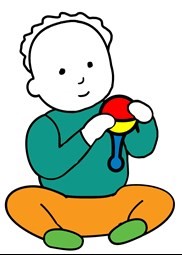Your baby is now a year old and may be a lot more mobile. Parenting can start to become demanding in a different way. You now need to think about safety and appropriate boundaries as well as caring for your baby.
baby is now a year old and may be a lot more mobile. Parenting can start to become demanding in a different way. You now need to think about safety and appropriate boundaries as well as caring for your baby.
Some parents miss their tiny baby and others are pleased that their baby has a little more independence. Remember as this independence grows your baby will still need you.
Between the ages of one to two years old there will be lots of changes as your child moves away from babyhood to being a toddler. Your child will want to to explore their surroundings as this is their safe space to learn new skills.
There are new things to learn like beginning to walk and developing speech and language. They are also learning how to deal with lots of different emotions. Children take their lead from parents and carers as their main role models.
Children will continue to return to you for reassurance that things are ok. This is all part of your child’s rapid brain development. Whether things go well or not they need you to help them feel safe and secure. Use a soothing and calm tone of voice and give gentle reassurance that all is ok if they seem worried. Show your pride and excitement when they try new things and manage new skills.
Supporting Development
Your toddler is developing fast, but they still need lots of support to continue learning new skills.
Help your child begin to understand their feelings. Talk about how you think they are feeling: “I can see you’re feeling sad”, “Wow, you’re happy today!”
Start with simple emotions such as happy, sad and angry. In time this will give your child words to express how they are feeling. This will help them explain their feelings more easily. It can feel a bit scary to have big feelings when you are little – by talking about them from early on they can learn it is ok to feel like this.
You could try copying the facial expressions they use; this helps them see you understand them.
 Praising your toddler when they have done something right is more effective than telling them off for doing something wrong like ‘you are being very gentle with the cat today – you are a kind boy’.
Praising your toddler when they have done something right is more effective than telling them off for doing something wrong like ‘you are being very gentle with the cat today – you are a kind boy’.At the age of 1-2 your child’s brain is developing more understanding and thinking skills. Talk to your child about what you are doing, feeling and seeing. This helps develop their own understanding of emotions and develop key language skills.
All children develop at different rates - even within a family - so don’t expect your child to do the same thing at the same time as another child.
Toddlers will continue to need support to explore their world through play. They will show strong emotions like joy and pleasure when they succeed. They show sad or angry feelings when things are not going right or as expected. Their good and bad feelings both matter. Letting your child know you understand is important. Try ‘tuning in’ to why your child is behaving the way they are. You can show your child you understand by ‘naming’ the emotions they are showing, giving them the language for their feelings.”
will continue to need support to explore their world through play. They will show strong emotions like joy and pleasure when they succeed. They show sad or angry feelings when things are not going right or as expected. Their good and bad feelings both matter. Letting your child know you understand is important. Try ‘tuning in’ to why your child is behaving the way they are. You can show your child you understand by ‘naming’ the emotions they are showing, giving them the language for their feelings.”
Developing Play Skills
To help your toddler to develop their play skills, you could:
Turn-taking in play gives your child a growing sense of self. This teaches them that they are separate from you, increasing their independence and ability to make their own choices.
Playing Together
Playing together helps you feel connected with your child. To make the most of your child’s playtime you could try:
1. Following your child’s lead. Try providing a box and some bricks and see what your toddler does with them.
2. Go slowly.
3. Talk to your toddler about what they’re doing “Clever, building the bricks!” “What a tall tower!” “All fall down” as they knock them over.
Play gives them opportunities to practise having ‘big’ feelings such as frustration, anger and happiness in a safe place. They can see how these emotions feel in their body. You can help in ‘containing’ these feelings when you respond with a soothing, calm tone and gentle reassurance and join in with happiness. In time this will show them how to do this for themselves.
You can contact the Healthy Child Programme by calling Just One Number on 0300 300 0123 or texting Parentline on 07520 631590. Our opening hours are 8am-6pm Monday-Friday (excluding bank holidays) and 9am-1pm on Saturdays.
If you are 11-19 you can text ChatHealth on 07480 635060 for confidential advice from one of our team.
For 11–25 year olds Kooth is a free, confidential and safe way to receive online counselling, advice and emotional well-being support.
Childline - Children and young people under 19 can call 0800 1111 for free support.
Young Minds Parents Helpline - Call 0808 802 5544 for free Mon-Fri from 9.30am to 4pm.
To speak to other Norfolk parents and carers, you can join our online community forum below.